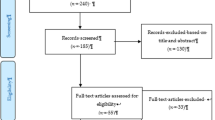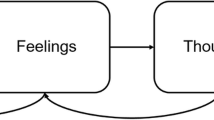Abstract
Dysfunctions of metacognitive aspects of metamemory and metaconcentration are common in substance use. No questionnaire tool has been validated among substance users to assess these metacognitive abilities. Therefore, this study investigated the psychometric properties of a brief metamemory and metaconcentration scale (BMMS) in adults with substance use. Using a cross-section design, participants (n = 395, age = 18–45 years, 22.7 ± 2.4 kg/m2) were purposively selected from houses earmarked by simple random sampling in Mizan, south-west Ethiopia. Interviewer-administered BMMS, the severity of dependence on khat (SDS-khat), and a socio-demographics tool were employed. A two-factor model with correlated error terms was found valid based on adequate model fit and measurement invariance across gender groups. No major ceiling or floor effect was found in the BMMS scores. Good internal consistency (Cronbach’s alpha = 0.83) and adequate internal homogeneity (moderate to strong item-total ISI score correlations; r ≥ 0.46) were found. Khat dependent and non-dependents differed significantly across BMMS total score, factor scores and all the item scores except three. The BMMS has adequate psychometric validity in the population with substance use.

Similar content being viewed by others
References
Bongard, S., Al’Aabsi, M., Khalil, N. S., & Al Habori, M. (2011). Khat use and trait anger: effects on affect regulation during an acute stressful challenge. European Addiction Research, 17(6), 285–291.
Buckner, T. W., Wang, M., Cooper, D. L., Iyer, N. N., & Kempton, C. L. (2017). Known-group validity of patient-reported outcome instruments and hemophilia joint health score v2.1 in US adults with hemophilia: results from the pain, functional impairment, and quality of life (P-FiQ) study. Patient Preference and Adherence, 11, 1745–1753. https://doi.org/10.2147/PPA.S141392.
Cartwright-Hatton, S., & Wells, A. (1997). Beliefs about worry and intrusions: the meta-cognitions questionnaire and its correlates. Journal of Anxiety Disorders, 11(3), 279–296. https://doi.org/10.1016/S0887-6185(97)00011-X.
Casaletto, K. B., Obermeit, L., Morgan, E. E., Weber, E., Franklin, D. R., Grant, I., & Woods, S. P. (2015). Depression and executive dysfunction contribute to a metamemory deficit among individuals with methamphetamine use disorders. Addictive Behaviors, 40, 45–50. https://doi.org/10.1016/j.addbeh.2014.08.007.
Cheung, G. W., & Rensvold, R. B. (2002). Evaluating goodness-of-fit indexes for testing measurement invariance. Structural Equation Modeling: A Multidisciplinary Journal, 9(2), 233–255. https://doi.org/10.1207/S15328007SEM0902.
Ciascai, L., & Lavinia, H. (2011). Gender differences in metacognitive skills. A study of the 8th-grade pupils in Romania. Procedia - Social and Behavioral Sciences, 29(2418), 396–401. https://doi.org/10.1016/j.sbspro.2011.11.255.
Comrey, A., & Lee, H. (1992). A first course in factor analysis (2nd ed.). Hillsdale: Lawrence Erlbaum Associates, Inc..
Costello, A. B., & Osborne, J. W. (2005). Best practices in exploratory factor analysis: four recommendations for getting the most from your analysis. Practical Assessment, Research & Evaluation.
De Alwis, D., Lynskey, M. T., Reiersen, A. M., & Agrawal, A. (2014). Attention-deficit/hyperactivity disorder subtypes and substance use and use disorders in NESARC. Addictive Behaviors, 39(8), 1278–1285. https://doi.org/10.1016/j.addbeh.2014.04.003.
Dixon, R., Hultsch, D., & Hertzog, C. (1988). The metamemory in adulthood (MIA) questionnaire. Psychopharmacology Bulletin, 24(4), 671–688.
Dunlosky, J., & Metcalfe, J. (2008). Metacognition (1st ed.). Thousand Oaks: SAGE Publications, Inc..
Field, A. (2013). Discovering statistics using IBM SPSS statistics (5th ed.). London: SAGE Publications Ltd..
Flavell, J. H. (1979). Metacognition and cognitive monitoring: a new area of cognitive–developmental inquiry. American Psychologist, 34(10), 906.
França, A. B., & Schelini, P. W. (2014). Análise semântica e evidências de validade da escala metacognitiva para idosos. Avaliação Psicológica, 13(3), 333–341 Retrieved from http://pepsic.bvsalud.org/scielo.php?script=sci_arttext&pid=S1677-04712014000300005&lng=pt&nrm=iso&tlng=pt.
George, D., & Mallery, P. (2003). SPSS for windows step by step: answers to selected exercises. A simple guide and reference, 63. 9780335262588
Gizewski, E. R., Müller, B. W., Scherbaum, N., Lieb, B., Forsting, M., Wiltfang, J., Leygraf, N., & Schiffer, B. (2013). The impact of alcohol dependence on social brain function. Addiction Biology, 18(1), 109–120. https://doi.org/10.1111/j.1369-1600.2012.00437.x.
Jaccard, J., & Wan, C. (1996). LISREL approaches to interaction effects in multiple regression (quantitative applications in the social sciences). Thousands Oaks: Sage Publications.
Kassim, S., & Croucher, R. (2006). Khat chewing amongst UK resident male Yemeni adults: an exploratory study. International Dental Journal, 56(2), 97–101.
Kassim, S., Islam, S., & Croucher, R. (2010). Validity and reliability of the severity of dependence scale for khat (SDS-khat). Journal of Ethnopharmacology, 132(3), 570–577. https://doi.org/10.1016/j.jep.2010.09.009.
Kassim, S., Croucher, R., & Al’Absi, M. (2013). Khat dependence syndrome: a cross sectional preliminary evaluation amongst UK-resident Yemeni khat chewers. Journal of Ethnopharmacology, 146(3), 835–841.
Kim, H.-Y. (2013). Statistical notes for clinical researchers: assessing normal distribution (2) using skewness and kurtosis. Restorative Dentistry & Endodontics, 38(1), 52–54. https://doi.org/10.5395/rde.2013.38.1.52.
Klusmann, V., Eversa, A., Schwarzer, R., & Heuser, I. (2011). A brief questionnaire on metacognition: psychometric properties. Aging and Mental Health, 15(8), 1052–1062. https://doi.org/10.1080/13607863.2011.583624.
Lachman, M. E., Andreoletti, C., & Pearman, A. (2006). Memory control beliefs: how are they related to age, strategy use and memory improvement? Social Cognition, 24(3), 359–385. https://doi.org/10.1521/soco.2006.24.3.359.
Le Berre, A. P., & Sullivan, E. V. (2016). Anosognosia for memory impairment in addiction: Insights from neuroimaging and neuropsychological assessment of metamemory. Neuropsychology Review, 26(4), 420–431. https://doi.org/10.1007/s11065-016-9323-3.
Le Berre, A. P., Fama, R., & Sullivan, E. V. (2017). Executive functions, memory, and social cognitive deficits and recovery in chronic alcoholism: a critical review to inform future research. Alcoholism: Clinical and Experimental Research, 41(8), 1432–1443.
Lenzo, V., Toffle, M. E., Tripodi, F., & Quattropani, M. C. (2016). Gender differences In anxiety. Depression And Metacognition, 1–16. https://doi.org/10.15405/epsbs.2016.05.02.1.
Lifson, A. R., Workneh, S., Shenie, T., Ayana, D. A., Melaku, Z., Bezabih, L., Waktola, H. T., Dagne, B., Hilk, R., Winters, K. C., & Slater, L. (2017). Prevalence and factors associated with use of khat: a survey of patients entering HIV treatment programs in Ethiopia. Addiction Science & Clinical Practice, 12(1), 3. https://doi.org/10.1186/s13722-016-0069-2.
Lim, C. R., Harris, K., Dawson, J., Beard, D. J., Fitzpatrick, R., & Price, A. J. (2015). Floor and ceiling effects in the OHS: an analysis of the NHS PROMs data set. BMJ Open, 5(7), e007765. https://doi.org/10.1136/bmjopen-2015-007765.
Lyvers, M., Onuoha, R., Thorberg, F. A., & Samios, C. (2012). Alexithymia in relation to parental alcoholism, everyday frontal lobe functioning and alcohol consumption in a non-clinical sample. Addictive Behaviors, 37(2), 205–210. https://doi.org/10.1016/j.addbeh.2011.10.012.
Manzar, M. D., Zannat, W., Moiz, J. A., Spence, D. W., Pandi-Perumal, S. R., Bahammam, A. S., & Hussain, M. E. (2016). Factor scoring models of the Pittsburgh Sleep Quality Index: A comparative confirmatory factor analysis. Biological Rhythm Research, 47(6), 851–864. https://doi.org/10.1080/09291016.2016.1202375.
Manzar, M. D., Alamri, M., Mohammed, S., Khan, M. A. Y., Chattu, V. K., Pandi-Perumal, S. R., & Bahammam, A. S. (2018a). Psychometric properties of the severity of the dependence scale for Khat (SDS-Khat) in polysubstance users. BMC Psychiatry, 18(1), 1–7. https://doi.org/10.1186/s12888-018-1917-2.
Manzar, M. D., Albougami, A., Salahuddin, M., Sony, P., Spence, D. W., & Pandi-Perumal, S. R. (2018b). The Mizan meta-memory and meta-concentration scale for students (MMSS): a test of its psychometric validity in a sample of university students. BMC Psychology, 6(1), 1–11. https://doi.org/10.1186/s40359-018-0275-7.
Manzar, M. D., BaHammam, A. S., Hameed, U. A., Spence, D. W., Pandi-Perumal, S. R., Moscovitch, A., & Streiner, D. L. (2018c). Dimensionality of the Pittsburgh sleep quality index: a systematic review. Health and Quality of Life Outcomes, 16(1). https://doi.org/10.1186/s12955-018-0915-x.
Maurage, P., de Timary, P., & D'hondt, F. (2017). Heterogeneity of emotional and interpersonal difficulties in alcohol-dependence: a cluster analytic approach. Journal of Affective Disorders, 217, 163–173.
Nelson, T. O., & Narens, L. (1994). Why investigate metacognition? Metacognition: knowing about knowing.
Ramey, T., & Regier, P. S. (2019). Cognitive impairment in substance use disorders. CNS Spectrums, 24(1), 102–113.
Reischies, F., Lobo, A., Turrina, C., Jonker, C., Fuhrer, R., Fichter, M., et al. (2008). Development of the EURO–D scale – a European Union initiative to compare symptoms of depression in 14 European centres. British Journal of Psychiatry, 174(04), 330–338. https://doi.org/10.1192/bjp.174.4.330.
Rhemtulla, M., Brosseau-Liard, P. É., & Savalei, V. (2012). When can categorical variables be treated as continuous? A comparison of robust continuous and categorical SEM estimation methods under suboptimal conditions. Psychological Methods, 17(3), 354–373. https://doi.org/10.1037/a0029315.
Saladin, M. E., Santa Ana, E. J., Larowe, S. D., Simpson, A. N., Tolliver, B. K., Price, K. L., et al. (2012). Does alexithymia explain variation in cue-elicited craving reported by methamphetamine-dependent individuals? American Journal on Addictions, 21(2), 130–135. https://doi.org/10.1111/j.1521-0391.2011.00214.x.
Salahuddin, M., Maru, T. T., Kumalo, A., Pandi-Perumal, S. R., Bahammam, A. S., & Manzar, M. D. (2017). Validation of the Pittsburgh sleep quality index in community dwelling Ethiopian adults. Health and Quality of Life Outcomes, 15(1), 1–7. https://doi.org/10.1186/s12955-017-0637-5.
Slife, B. D. (1987). Can cognitive psychology account for metacognitive functions of mind? The Journal of Mind and Behavior, 8(2), 195–208 Retrieved from https://psycnet.apa.org/record/1988-31650-001.
Teferra, S., Medhin, G., Selamu, M., Bhana, A., Hanlon, C., & Fekadu, A. (2016). Hazardous alcohol use and associated factors in a rural Ethiopian district: a cross-sectional community survey. BMC Public Health, 16(1), 1–7. https://doi.org/10.1186/s12889-016-2911-6.
Wells, A., & Cartwright-Hatton, S. (2004). A short form of the metacognitions questionnaire: Properties of the MCQ-30. Behaviour Research and Therapy, 42(4), 385–396. https://doi.org/10.1016/S0005-7967(03)00147-5.
Acknowledgments
We are grateful to the participants of the study.
Funding
The authors extend their appreciation to the Deanship of Scientific Research at Majmaah University for funding this work under Project Number No (RGP-2019-40).
Author information
Authors and Affiliations
Corresponding author
Ethics declarations
Conflict of Interest
The authors declare that they have no conflict of interest.
Ethics Approval and Consent to Participate
The study was approved by the Human Institutional Ethics Committee Mizan-Tepi University; informed written consent was obtained from all participants. All authors have approved the final draft.
Consent to Publish
The participants provided informed written consent to publish though no personal and/or identifiable information has been published.
Additional information
Publisher’s Note
Springer Nature remains neutral with regard to jurisdictional claims in published maps and institutional affiliations.
Rights and permissions
About this article
Cite this article
Manzar, M.D., Salahuddin, M., Khan, T.A. et al. Psychometric Properties of a Brief Metamemory and Metaconcentration Scale in Substance Use Problem. Int J Ment Health Addiction 19, 1690–1704 (2021). https://doi.org/10.1007/s11469-020-00256-6
Published:
Issue Date:
DOI: https://doi.org/10.1007/s11469-020-00256-6




